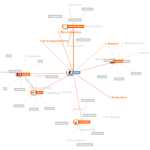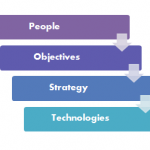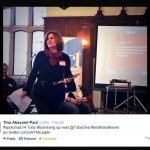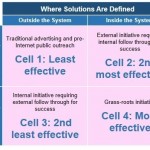Relationships are the heart of many successful social media outreach efforts. They help fuel viral success (second only to exceptional content) and serve as a catalyst for self-organizing online swarms. You need to be able to visualize connections and influence, however, before you can strategically leverage relationships to reach and inspire target audiences. That's where network mapping comes in. Depending on your objectives, you can map social media … [Read more...]
‘Disruptive’ Mobile Plays Well with ‘Older’ Radio
Many of us in developed countries find it annoying when somebody calls and hangs up before you can answer. But in developing countries, "missed calls" are becoming an extremely cost-effective cue for transmitting and obtaining information—without incurring fees for voice calls or text messages. In India, for example, small businesses call vendors and hang up to indicate they need deliveries, fishermen use a "missed call" to inform buyers they are on the way back … [Read more...]
Why Half Your Audience Won’t Listen to You
"If you want the truth to stand clear before you, never be for or against. The strugge between 'for' and 'against' is the mind's worst disease." —Sent-ts'an, c. 700 C.E. Who is your target audience? The first question you need to ask before starting a communications project can come down to analyzing one key motivator for your target audience. Values. Before you can unite an idea with an emotion to inspire action, you have to understand why your target … [Read more...]
ICT Success = People First and Technologies Last
Does my recent rave review about xPotomac's innovations mean I think all conferences should feature mind maps and tweets instead of PowerPoints? I hope it goes without saying "of course not!" Why? Due to POST, which I've written about before briefly. POST is a useful acronym coined by Charlene Li and Josh Bernoff, the authors of Groundswell. It stands for People, Objectives, Strategy, and Technologies. The acronym is a reminder to always start information … [Read more...]
xPotomac, the Next ‘Big Thing’ and Behavior Change
Yesterday I attended xPotomac, a conference on the most influential media technologies most likely to impact businesses and marketers in the immediate future. Both the conference's content and its organization showcased disrupted shifts in recognizing and harnessing change. Its organization you ask? What I found interesting was the fact that none of the speakers used extemporaneous PowerPoints. Instead, they used handhelds with colorful mind maps to … [Read more...]
Crowd Accelerated Innovation and the War of Ideas
One of my posts from 2010 was about a TED video on “Crowd Accelerated Innovation.” The video is about how the Internet is connecting people all around the world, enabling people who otherwise would never meet to share ideas and fuel and perfect innovation. I recently connected with David Bailey of The Military Social Media Blog after writing my recent series of posts about the lack of sound communications strategy plaguing the U.S. military in the very places … [Read more...]
The ‘Knowledge Management’ Cure?
A potential cure exists for the lack of sound communications strategy plaguing the U.S. military in the very places sound strategy is needed most to curb Islamist extremism. As I’ve blogged about before, it’s mindboggling that the suggested reason for obvious blunders is large contractors hoping to make an easy buck pushing sales/ marketing/attitudinal communications to enact change versus the more effective behavioral/ strategic communications approach. The … [Read more...]
Channeling Sun Tzu, Not Orwell’s 1984
Sadness. Shock. Disbelief. These are the emotions I felt reading a recent report by the Strategic Studies Institute of the U.S. Army War College indicating the U.S. military's information operations (IO) and strategic communication efforts were bungled in the very places they were needed most to curb Islamist extremism. As I've blogged about before, it's mindboggling that the suggested reason is large contractors hoping to make an easy buck … [Read more...]
Parallels with ‘Fake’ Mandela Signer Hiring Problem?
What do the South African government officials who hired the "fake" sign language interpreter for Nelson Mandela's memorial have in common with U.S. military commands charged with contracting communication firms for information operations (IO) and strategic communication efforts? Apparently, hiring people without the necessary expertise because they have no background in the area. According to a fascinating report by the Strategic Studies Institute of the U.S. … [Read more...]
Facebook’s ‘Simplistic’ Analytics Failing Marketers?
Claiming "Facebook is failing marketers," a report by research firm Forrester unleashed a social media firestorm this week. The report documented the results of a survey of 395 marketers in the United States, the United Kingdom, and Canada. The marketers were asked to rank the business value derived from digital marketing opportunities from Facebook, Twitter, and YouTube to onsite ratings and reviews to branded communities and blogs. They rated Facebook dead … [Read more...]
Crowdsourcing USAID Monitoring and Evaluation
Crowdsourcing! Big Data! International Development! A recent Washington Post article on future U.S. Agency for International Development (USAID) monitoring and evaluation (M&E) activities in Afghanistan piqued many of my interests. According to the article, after coalition forces withdraw from Afghanistan next year, only 20 percent of U.S.-funded reconstruction projects worth billions of dollars will be in areas safe enough for U.S. officials to visit and … [Read more...]














